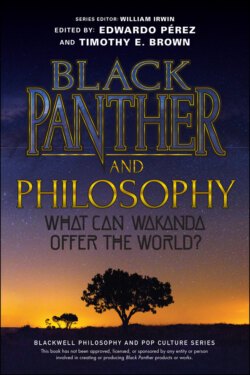Читать книгу Black Panther and Philosophy - Группа авторов - Страница 39
“More Connects Us than Separates Us”
ОглавлениеEtieyibo argues that if we unpack the concept of ubuntu, and the fact that we are persons through our recognition of others’ humanity, then we should be drawn toward a cosmopolitan view: a view that holds the scope of our moral obligations is not affected by state (or other) boundaries.10 While ubuntu was traditionally practiced in small communities, Etieyibo argues that the underlying philosophy does not have any grounds to justify it having to be only practiced within small communities. Ubuntu is based on our shared humanity, not on our shared kinship: it is I am because you are, not “I am because you are my cousin, or clansperson.”
Some argue that today we are at the “end of ubuntu” for various reasons, including the strategic use and manipulation of the concept by politicians.11 Part of the argument is that we no longer have the small communities required to make ubuntu work. Yet, we do not have the counterfactual example of how ubuntu would have adapted to the slow creation of larger communities and industrialization. So we cannot tell how much of the corrosion of the practice of ubuntu and its defining role in society is because of colonialist intervention and how much is down to the reality of living in large cities.
Of course, it seems reasonable to agree that ubuntu as practiced in a small-scale community would not function in the same way. But, is there a way the underlying values of ubuntu – the valuing of mutuality, compassion, respecting, and recognizing the humanity of the other – would have grown and adapted to being the guiding principles of a modern African state? Why did the creators of Wakanda not use this opportunity to imagine such a state? Given its centrality in considerations of the morality of the people of sub-Saharan Africa, particularly in Bantu-speaking communities, it is surprising that the proverb, word, or spirit seems largely lost in the Wakanda we find at the beginning of the film.
African Philosopher Michael O. Eze argues that ubuntu provides a foundation for a society that welcomes difference, that lays the groundwork for a “new paradigm of human citizenship that is both universal and provincial” where “we do not have the dilemma of choosing our own kind over the stranger for even the stranger is a potential relative.”12 This account speaks not to the tearing down of all borders or notions of community, but to viewing the rooted community as fundamentally open to others. Indeed, ubuntu can provide a new, stronger grounding for a cosmopolitan theory.
Traditionally in Western thought, the basis for a cosmopolitan view is that we are all fellow human beings and thus of equal moral worth. Human beings have been defined as those who share the quality of being able to reason. Eze argues that this Western cosmopolitanism, as is seen through colonialism, is “not so much about elimination of difference but an invention of a homogenous other.”13 Reason, Eze argues, is provincial: it can be dominated by culture, religion, and other features of our context.14 It is not a reliable ground for a truly cosmopolitan theory. Eze argues instead that ubuntu, and its inherent relatedness, can do much better in justifying a cosmopolitan worldview, adding that ubuntu grounds a duty to “recognize others in their unique difference, histories and subjective equations” and that this sense of humanism “is not only a recognition of our kind.”15
While cosmopolitanism based on reason requires recognizing in others the same ability to reason, a so-called Xerox of my being, the ethics of ubuntu in fact thrives on difference: “the other constitutes an inexhaustible source of our reason to be.”16 Human interaction is a mutual self-creating process, and there is nothing within the concept of ubuntu that prioritizes the recognition and interaction with those of “our own kind” over the other.17 In fact, Eze argues that traditional communities would welcome the stranger and grant them epistemic preference (view them as the superior bringer of knowledge) because of their access to fresh ideas.18 This interaction is motivated, Eze claims, by a “desire of harmonization of ethical virtues and common good.”19
